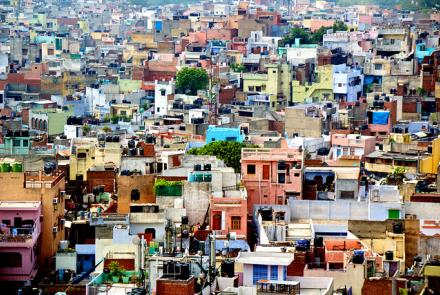
Image by Jose Antonlo Morcllo on Flickr. http://bit.ly/1RohCl5
Benchmarking and bureaucracy in India
International rankings and benchmarking can provide useful policy tools to achieve national development goals, argues Ramesh Thakur.
A striking feature of the contemporary era is the number of inter- and non-governmental organisations that issue comparative rankings based on global benchmarks for every imaginable subject. The surprising aspect is why a major country like India does not use governance indicators as a very useful policy tool to achieve national development goals by benchmarking performance against global norms.
India ranked 134 of 189 on the World Bank’s ease of doing business indicators in 2015, (improving to 130 of 189 in the 2016 rankings released last October), 130 of 188 on the UN’s human development and also on gender index, and 115th most corrupt out of 174 in Transparency International’s 2014 perceptions index. Annual reports by the Hong Kong-based Political and Risk Consultancy Ltd., based on surveys of business executives, rate India’s bureaucrats the most inefficient in Asia.
In tourism, India should rank first in the world with its wealth and diversity of natural beauty, the richness of historical and cultural heritage and sites, the varied cuisines, the religious significance, etc. But the shoddy infrastructure, visible poverty, incessant harassment by beggars, touts and vendors, health and safety considerations and user-unfriendly visitor regulations are major turn-offs for all but the most determined. So in last year’s World Economic Forum tourism competitiveness ranking of 141 countries, India placed 52nd.
A favourite statistic for some years has pointed out that India has more cell phones than toilets. The result is India accounts for more than half the world’s total population who defecate in the open: a practice that, according to United Nations studies, costs US$260 billion globally through the spread of infectious diseases, keeps women under threat of harassment, violence and rape, and compels young girls to abandon school when they reach puberty. Not all the perfumed slogans of Make in India will remove the sights and smells of India. To his credit, the cellphone loving Prime Minister Narendra Modi has made sanitation and public cleanliness a top priority.
Five years ago, the Program for International Student Assessment (PISA) published findings of the 2009–10 comparative national academic performance of 520,000 15-year old school students in maths, science and English. (The tests were first performed in 2000 and are repeated every three years.) In the 73 countries tested, India came second last, ahead only of Kyrgyzstan. Comparing scores, an eighth-grade Indian student fared the same as a South Korean grade three or a Shanghai grade two student. A petulant India refused to take part in subsequent studies, blaming the results on the unfairness of the tests rather than the quality of India’s schooling. The story is the same in university rankings year after year, with no Indian universities in the world’s top 200 list.
In 2012, a survey of height and weight of more than 100,000 children in six Indian states found that 42 per cent of children are moderately-severely underweight, and 59 per cent suffer from moderate-severe stunting. Prime Minister Manmohan Singh described the results as a ‘national shame’. On the social and economic side, it should be a matter of great national shame that India has the world’s biggest pool of poor, sick, starving and illiterate. Indeed, a 2012 global poll of experts concluded that, based on infanticide, child marriage and de facto slavery, India is the worst country in the G20 in which to be a woman.
A pressing concern for residents of India’s capital is the sad statistic that Delhi is ranked the most polluted city in the world. Indeed, the World Health Organization (WHO) lists 13 Indian cities among the world’s 20 worst polluted. The report ranked around 1600 cities in 91 countries for the quality of their ambient air, measured for annual mean concentrations of particles smaller than 10 or 2.5 microns. The database covers the period 2008–13, weighted towards 2011 and 2012. Against the world average of 71ug/m3 (micrograms per cubic metre of air), the annual average in Delhi is 153 ug/m3, six times the WHO’s recommended maximum. The count spikes to much higher levels over the course of a year. Breathing Delhi’s air is considered to be the equivalent of smoking a packet of cigarettes daily and Delhites’ lungs resemble the ‘black lung’ disease of coal miners. Not surprisingly, then, Delhi children show statistically significant lower birth weight.
The Washington-based Nuclear Threat Initiative released its third biennial Nuclear Security Index, prepared in collaboration with the Economist Intelligence Unit, on 14 January. Among the world’s 24 states with weapons-useable nuclear materials, India ranks a lowly 21 out of 24 (above only Pakistan, Iran and North Korea). The 2016 index for the first time also assesses nuclear security conditions related to the protection of nuclear facilities against acts of sabotage for 45 countries that operate nuclear power plants or research reactors. India is ranked 36th. Given the recent terrorist attack on the Indian Air Force base in Pathankot near the India-Pakistan border, this should be of concern to the people and government alike.
According to an Economist Intelligence Unit study last year, India is not even a good country in which to die, ranking 67 of 80 on the quality of palliative health care (the United Kingdom, Australia and New Zealand top the list).
Overly sensitive governments will attack the messenger with full Yes Minister-style efforts to belittle and discredit the international rankings, casting aspersions on methodology, motives, bias, data reliability, etc. But sensible states will make full use of them as global benchmarks against which to track and improve their own record.
Prime Minister Modi could direct his ministers and top officials to improve India’s global rankings and then ruthlessly reward performance and punish non-performance. He could also commission equivalent studies on a state-by-state basis to educate citizens on how their states, and, therefore, the performance of the state governments, compare to national averages and global benchmarks.
This piece was first published on Policy Forum, the website of the Asia and the Pacific Policy Society and Crawford School.
Updated: 30 June 2024/Responsible Officer: Crawford Engagement/Page Contact: CAP Web Team













